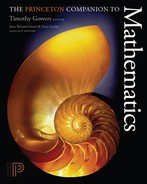VI.56 Gottlob Frege
b. Wismar, Germany, 1848; d. Bad Kleinen, Germany, 1925
Logic; foundations of mathematics, paradox
Frege was a precursor of modern logic, in that many of the hallmarks of contemporary logic appear first in his writing. His work has also been singularly influential outside the foundations of mathematics, especially in the philosophy of language.
Frege was trained at Jena and Göttingen, receiving a Ph.D. under Ernst Schering in 1873. His Ph.D. thesis addressed the spatial representation of imaginary elements in geometry, and his 1874 Habilitation essay at Jena worked out some basic details of what we would now call “iteration theory.” Though his early work gave no obvious sign of the revolutionary work to come, with hindsight one can discern a foundational motif running through even the apparently conventional mathematics of the early work: a conviction that arithmetic was in some way or other logical, and that geometry was fundamentally different and less general because it was grounded in spatial intuition. This is an especially salient concern in some of his areas of early research, such as Plücker’s line geometry and RIEMANN’S [VI.49] complex analysis, where the role of visual representation was a matter of some dispute. Frege sought to resolve the dispute by deriving arithmetic and analysis rigorously from logical principles. His motivation was not so much a desire for certainty: rather, he held that only “gap-free” proofs can reveal a science’s fundamental principles.
Among the features of contemporary logic appearing first in Frege’s core logical writings (Begriffsschrift (1879) and Grundgesetze der Arithmetik (volume 1, 1893; volume 2, 1903)) are the following.
(i) Inferences are analyzed within a quantified logic of propositions, which extends to relations as well as to propositions of subject-predicate form. We would today describe Frege’s logical system as a higher-order predicate calculus.
(ii) Forms from syllogistic logic (such as “All As are Bs”) are interpreted as quantified conditionals (“For all x, if x is an A, then x is a B”), in the way that is now so standard as to seem inescapable, presenting implicitly the point that the underlying logical form of a proposition may differ from its surface grammar.
(iii) The syntax of the language is explicitly displayed, and inferences are carried out strictly in accordance with the form of statements by explicitly stated rules.
(iv) Rules of inference and axioms are distinguished; the consequence relation and conditionals are distinguished.
(v) “Function” is taken as an undefined primitive concept. (This was a contentious move. Some mathematicians of the time, including one of Frege’s teachers, Alfred Clebsch, held the concept of function to be too vague to serve as a basic building block.) A sharp distinction is enforced between functions and the things (called objects) that can be arguments of functions.
(vi) Quantifiers can be iterated, making possible the logical representations of distinctions such as that between uniform and pointwise convergence.
However, any simple catalogue of novelties understates the crystalline sharpness of Frege’s logical writing when compared with works with similar aims, such as the later Principia Mathematica of Whitehead and RUSSELL [VI.71]. It would be several decades before logicians approached Frege’s standards for exactness and clarity. The notation, however, seemed unwieldy to readers at the time (and since). Here, for example, is the statement “if not q, then every v is F” ¬q ⇒ (∀ v) F(v)) in Frege’s notation:

(Here ![]() represents negation,
represents negation, ![]() is the universal quantifier, and the long vertical line represents the conditional.)
is the universal quantifier, and the long vertical line represents the conditional.)
Frege also wrote an informal treatise, Grundlagen der Arithmetik (1884), which has had a profound influence on English-language philosophy since its translation in 1950. Its account of number contains the first hint of the tension that would collapse the project from within. Frege sets out conditions that a definition of number must satisfy to be counted as “acceptable.” However, when formalized these lead to a contradiction, of a similar type to Russell’s paradox (on the set of all sets that are not members of themselves). This problem escaped Frege’s notice until Russell alerted him to it in a letter of 1903. Frege’s reaction (“arithmetic totters”) has been taken to be an overreaction to the failure of one set of axioms among many possible ones. But in Frege’s view, the problem was not with the specific axioms, but rather that any logically adequate weakening appeared to violate some principle he took to be grounded in the nature of thought. Recently, many logicians who do not share Frege’s often baroque-seeming metaphysics of concepts have shown that some natural consistent weakenings of Frege’s system do support the derivation of the mathematics Frege aimed to reconstruct.
The years after 1903 brought personal tragedies in Frege’s life and he ceased serious work for over a decade. Though he resumed writing in 1918 with a series of philosophical articles, his only research in mathematics was a brief jotted effort to found arithmetic on geometry, rather than logic, indicating his conclusion that his logical program had failed.
Further Reading
A particularly detailed recent example of “neo-Fregean” reconstructions of Frege’s foundations of arithmetic appears in John Burgess’s Fixing Frege (Princeton University Press, Princeton, NJ, 2005). Many of the classic papers on the technical details of reconstructing Frege’s philosophy of logic are reprinted in Frege’s Philosophy of Mathematics (Harvard University Press, Harvard, MA, 1995) by William Demopoulos.
